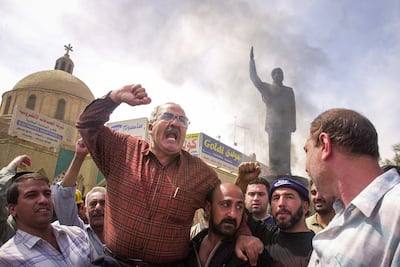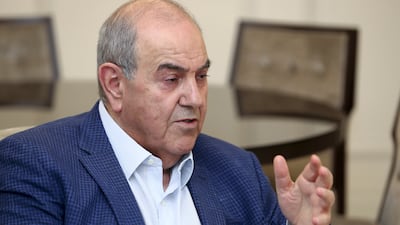Related: How Iraq's first free leaders bore a London legacy
Civil war could break out in Iraq unless prison reforms and national unity are enforced, the country's first prime minister since the 2003 invasion, Ayad Allawi, told The National.
Mr Allawi, a secular Shiite Arab and former vice president, warned of the possibility of rising sectarian tensions in the country and said a new wave of extremism was brewing in Iraq's overcrowded jails.
"Prisons are becoming a fertile ground for extremism. Before it was between Sunnis and Shiites, now it's involving tribes, involving regions, involving districts. The problem, if this continues, will be a civil war throughout the country," he told The National from his home in London. It is 20 years since he took office in Baghdad.
former Iraqi Prime Minister
Mr Allawi also believes prisons are a "breeding place for ISIS" and the extremist group could be on the rise.
He said one solution would be to "clear prisons" from those who have been "accused of political reasons – there must be a pardon". There must be a push for national unity and reconciliation between Iraq's various ethnic and religious groups that are currently ruling the country, he added.
Mr Allawi spoke with disappointment about what Iraq has endured during the two decades since the US invasion that dismantled the government of Saddam Hussein, security forces and law enforcement.

Years of corruption and sectarianism have since dominated Iraqi politics, with Iraq’s ethno-sectarian Shiite, Sunni and Kurdish political parties infiltrating ministry and government posts.
The political divisions created widespread violence that led to a brutal civil war in 2006 and the formation of ISIS, which took over one third of Iraq in 2014.
Mr Allawi says that while these periods of tumult appear over, the same powerful, destructive tensions are rising again, behind the scenes.
"Now there is an unspoken civil war. I was against the occupation and war but the Americans wanted to divide the country into Sunnis and Shiites. Now we see Shiites versus Sunni, Shiites versus itself and Sunnis against each other," he said.
"The Sunnis until now cannot elect a man to become Parliament Speaker due to their differences."
Mr Allawi referred to a recent failure of Sunni political parties to elect a Speaker – a position usually reserved for the religious group in Iraq's so-called quota system, known as muhasasa tafi'iya.

The dispute over who will take the position is the latest in a series of failed attempts to replace Mohammed Al Halbousi, who was dismissed in November, with political bickering and divisions between key Sunni parties derailing every effort so far.
The row is a microcosm of years of political paralysis in the country where government formation – choosing key executive and cabinet positions – is often bogged down in factional rivalry.
Since the post-Saddam constitution in 2005, the prime minister is a member of the Shiite community, the speaker is a Sunni and the largely ceremonial role of president is held by a Kurd. However, the formula is strained as a result of sectarian agendas and has failed to prevent bloodshed.
"The mistake was, then we did not apply equal citizenship to everybody and we had a quota-run government," he said.
Iranian meddling
In 2004, Mr Allawi served on the Governing Council and was unanimously elected to become Iraq's first postwar prime minister on June 28.
The politician, who led the country for nine turbulent months, said the US and its allies have not protected Iraq's democracy, which caused endless internal conflict that has spilt into the region.

In the 2010 elections, Mr Allawi won more seats than Nouri Al Maliki – his fiercest competitor and close ally of Iran – but fell short of a majority. He accuses Iran of blocking his bid to become prime minister.
During government formation after the election, a number of candidates loyal to Mr Allawi were removed from office after Mr Al Maliki accused them of links to the banned Baath party.

Critics of Mr Al Maliki said the move was a brazen attempt to falsify charges and improve the position of his State of Law coalition. Talks broke down and Mr Al Maliki would go on to lead Iraq for another four years, a period which featured the rise of ISIS.
"Iran played a very negative role, to tell you the truth, very negative. We were supported by the Americans from the very beginning," said the politician, 80.
Tehran denies any interference in Iraqi politics and says it has only provided military assistance to Shiite paramilitary groups in their fight against ISIS, and framing bilateral ties as normal economic relations.
For years Iraq has been caught up in the region's sectarian divisions. But tensions were further exacerbated when Tehran leveraged its ties with Iraq's Shiite majority and emerged as the country's major foreign power broker.

"Because Iran played a role when America overthrew Saddam, Iran collaborated with the Americans and they started dictating things as events went by in Iraq, until 2010 when they came and said, 'Allawi, cannot form the government'."
His electoral campaign was based on an attempt to rise above sectarian differences and unite the country.
Mr Allawi says the prevailing political conditions at the time of the elections and the mechanics of the polls were not conducive to a fair voting system.
"If I'd known this was the case then I wouldn't have had the elections," he said.
"I would say that there shouldn't have been any group or list that appears as Shiite or Sunni or Kurdish. This is something that I should have done," he added.
Push for national unity
Mr Allawi led a coalition government that he says was committed to a secular future for Iraq.
He pressed this issue soon after the invasion, warning there should be no distinction between the Shiites and the Sunnis, Christians and Muslims, women and men. "This is very important. If we can't move around these, then this government will fail,” Mr Allawi said.
He recently informed senior politicians in Baghdad from the government of Prime Minister Mohammed Shia Al Sudani of his concerns but said they responded by stating they are unable to do anything about the situation.
“I said why? What's the problem? You should do it, and you should call for early elections. Really, we need to rectify ourselves before we lose Iraq as a whole,” he said.
Mr Allawi blames the US for creating a divide in the country between Sunnis, Shiites and Kurds, and igniting sectarian tensions. "These kind of problems occurred in Iraq then and multiplied gradually with time to become what you know as Iraq right now."
Militias rise again
An attack on a KFC restaurant in Baghdad this month has raised questions over whether the relative calm and stability in Iraq during the years followed the defeat of ISIS can be sustained, Mr Allawi said. A small incident of vandalism on the surface, the attack highlights the impunity of Iran-backed militants now on the government payroll, he added.
The attack was the third in just over a week and was reported by a senior official in the Iran-backed Iraqi armed group Kataib Hezbollah, which released a statement calling on Iraqis to "boycott and expel" US brands. They claim the move is in response to Israel's war in the Gaza Strip.

"If this continues, then we will see a direct attack on the Americans who are stationed in Iraq, this is a big possibility," he said.
Born in 1944, a neurologist by training, the former minister returned to Iraq after Saddam's fall. His wife and three children lived for a while in Jordan and now divide their time between London and the UAE.
He has been politically active since 1968, founding the Iraqi National Accord in opposition to Saddam’s regime, and has survived several assassination attempts, one of which left him in hospital for nearly two years.
He warned Iraq could be divided if differences between political parties continue.
"We need the rule of law, national unity, we need to implement the concept of citizenships. You know, Iraqis are willing to drown in the sea instead of being a citizen of the country that's failing to provide adequate public services," he said.


